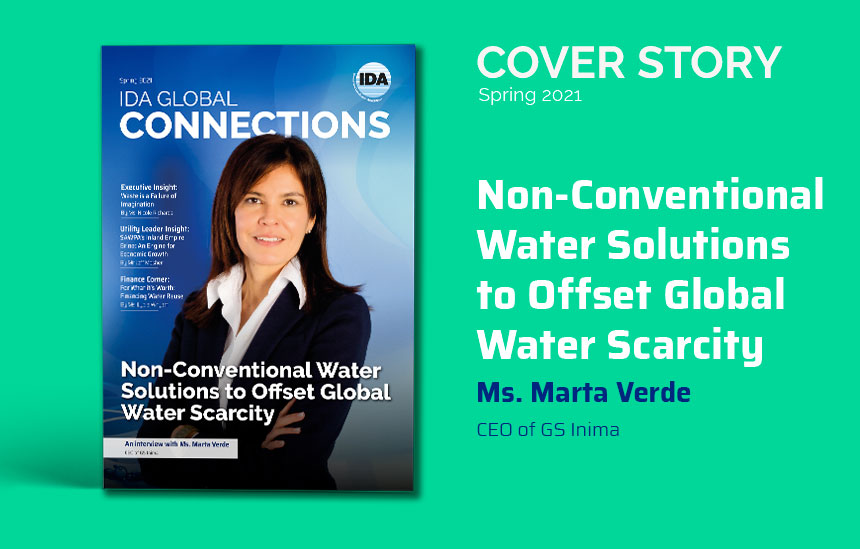Published on IDRA Global Connections Spring 2021 Issue
- An interview with Ms. Marta Verde, CEO of GS Inima
How long have you been in the water sector and serving as CEO of GS Inima?
I have been working in the sector since 1996 and as CEO in GS Inima since December 2015.
What is your vision of the new water era and the role of non-conventional water solutions to offset global water scarcity?
I believe in the water sector; there has been a considerable advance in conventional technologies in efficiency. Now is the era of resource optimization not only in water but in all-natural resources. The water challenge will be based on creating this efficiency through a circular economy based on water reuse where the wastewater will become a resource instead of a waste.
Wastewater to become a primary source of drinking water will require a change in the current regulations and a great effort from the governments to change the public perception on projects aimed at providing people with reused drinking water.
Definitely, wastewater and re-utilization should be addressed from an integrated management point of view. Microplastics and sludge treatment are also a challenge for technology nowadays.
How do you see the desalination and water reuse market in Latin America, where GS Inima is quite active?
Latin America market is a challenging market with plenty of needs. Emerging economies are demanding more water resources, and in some other countries, there is still a relevant increase of basic sanitary systems to be completed.
A boost from LATAM governments is necessary so that populations from different countries understand that water is a basic necessity and there is no possible economic development or prosperity without it. In addition, it is essential to provide political stability and an adequate legal framework to investors (foreign or local). In this way, long-term projects (3P or other) will be feasible and bankable.
A good example is Brazil, where the new legal framework for sanitation, approved in 2020, strengthens legal and regulatory security, promotes greater participation by the private sector, and consequently brings great prospects to the market.
Now that GS Inima has got several significant contracts in the Middle East, a booming market, what would you say are the key areas of excellence GS Inima has to meet the region’s needs?
GS Inima has excellent technical and financial expertise in concessions. Our main activity is based on that, so we know how to optimize the concession parameters to provide a competitive tariff.
Technical expertise has provided us a vast capability to optimize energy consumption. The most recent experience in Atacama desalination plant shows that we easily beat the barrier of 2.8Kw/m3.
In addition to such technical knowledge, we must, of course, add that GS Inima participates in all stages of the concessional model, i.e., SPV, EPC, and O&M, which allows us a global and deep knowledge of the business to act on all its different parts. Finally, the fact that our shareholder is GS E&C allows us to have access to Korean financing at very advantageous conditions.
In summary, experience, suitable financing, and technical knowledge to optimize construction and operating costs are the keys to success.
How do you see the future trends of the sector?
The water sector, like any other, is increasingly focused on cost reduction and the use of alternative energies. Waste reduction is also a challenge in the market.
Not surprisingly, the GS Inima R + D + I department currently has several projects under development in this regard, such as FOWE project, a process based on Forward Osmosis to produce drinking water from two waste: Brine and wastewater.
OSCAR project, a process to eliminate the organic matter from the sludge produced by WWTP. PRONOX project a high rate activated sludge process to reduce the energy consumption in WWTP and the more recent ROWSIP project, a new conception
design of desalination facility of high efficiency and reduced CAPEX.
Efficiency and waste reduction are a challenge for the sector, and Companies are focused on that.
Do you see a need for associations like the IDRA to advocate for new policies that would promote greater water sustainability? If so, what types of policies?
Undoubtedly, associations such as IDRA, to which GS Inima has been a proud member for many years, must be the promoters of development and more sustainable and rational use of water. The promotion of policies and the share of knowledge at favoring, among others, the reuse of water as a viable alternative for drinking water in those countries where there is scarcity should be a must for IDRA.
What advice would you give to women in the sector on leadership?
In my experience, it is essential not to lose focus.
Usually, there is a lot of “nois” around us, and so many eyes taking a look at you or trying to check your capabilities.
If you ignore that and dedicate your efforts to achieve the goal, it will be sure that the market will recognize your value.
You can avoid so much stress and improve the results without considering what people think you can or cannot do; just do it!




